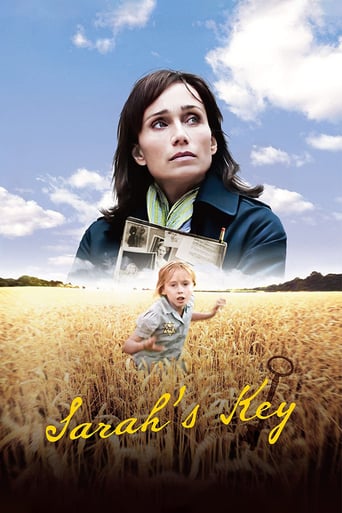room102
Based on a novel, the movie follows a journalist investigating the story of a French Jewish girl during WW2 in France. The movie goes back and forth between 1942 and 2002. Although the plot itself is fiction, it deals with true events that happened in France during that time.Good direction, good production and excellent acting by the young actress playing Sarah (it's a shame she wasn't nominated for any award).The film is very moving (brought tears to my eyes more than once) and although it's not nearly as "harsh" as "In Darkness (2011)" and not based on a true story, the plot is more interesting.The second half of the movie changes direction, so it's not as good as the first half. Still, a very good movie.
mmmarks
I side with those who rate this film very highly, and find those who argue more negatively to be unconvincing. I'm glad to read in some of the other reviews that the novel upon which this film is based is quite wonderful. But please don't let that opinion become a stick with which to beat up a very good film in its own right. (I knew nothing about the novel before watching the film; I didn't find the jumps in time at all confusing—by now such editing has become commonplace and allows us to see connections that would otherwise be much more obscure.) Furthermore, the objections to the modern-story you will read in some user reviews miss the point. Of course it is "flatter" than the story of what happens to Sarah during WWII and after. How could it not be? But that is a necessary dramatic technique. The reporter becomes obsessed by a need to find out more and more—to follow Sarah's story wherever it must take her; and in doing so, she finds a way to cope with problems in her personal life, and she is recaptures a terrible chapter in history that is almost impossible to imagine. The further we get from the time WWII and the holocaust, the more "unreal" such stories are in danger of becoming: fodder for mindless comic-book action movies and alternative realities. I like Captain American, to be sure; and Inglourious Basterds is a great film in its own way, too. But the historical record does need to be kept alive, and brought home with immediacy. And yes, these things could well disappear from memory. This novel and film have found an intriguing way to tie us to the past, and to allow many many fine actors to shine. Highly recommended; but be warned: it is not an easygoing experience!
ray-cann
I finally saw Sarah's Key and I will say that its an excellent film. Kristin Scott Thomas was great as usual, but the real star was Melusine Mayance who played the young Sarah. She was phenomenal and an actress to keep an eye on in the future. I haven't read the novel by Tatiana de Rosnay, but it's possible the film could have taken several different directions. The time shifts between 1942 and 2009 did not bother me, but I preferred the scenes with Mayance over the scenes with Thomas. Others have commented that the shifts between the two stories was necessary to avoid having another typical "Holocaust" film, but if Mayance carried the film herself from 1942 onwards, it would have been fine with me. I liked how the film portrayed a France that we do not get to see often--their experiences during the Holocaust, Vichy, etc. Yes, there are clichés, but sometimes they cannot be avoided. Hey, it's film-making after all! Overall, I give high praise for this film. It's unfortunate that Thomas and Mayance did not receive Oscar nominations for these role (but is anyone really surprised?!) but they will go far and continue to impress us
Emma_Stewart
Sarah's Key weaves two stories together into a touching portrait of how history affects us all, long after it's happened. In July 1942, Sarah Starzynski and her Jewish family were rounded up and taken to the Vel' d'Hiv with thousands of other French Jews, where they lived for days in absolutely inhuman conditions until they were shipped to concentration camps. As they were being arrested, Sarah locked her brother in a secret closet so that he would be safe, and vowed to escape and come back for him.The second plot line revolves around Julia Jarmond, an American journalist who is on the verge of buying the apartment that Sarah lived in. She undertakes the task of finding out as much about Sarah and her family as she possibly can, uncovering secrets about her family, France, and herself along the way.Usually movies like this don't work out. I walked in expecting a sickeningly sentimental film, yet walked out devastated and with a heavy heart. Sarah's Key is absolutely harrowing, pulling no punches when it addresses France's involvement with the Nazi regime, and revealing the lingering effects that the Holocaust had on the psyches of those who survived it. The modern story isn't quite as gut-wrenching, but it is elevated by Kristin Scott Thomas in one of her best performances yet. She acts at times as a substitute for the audience: we can feel the devastation and heartbreak she feels with each new revelation and discovery. Also worth mentioning are Melusine Mayance, who gives one of the best child performances ever and in a perfect world would receive an Oscar nomination, and the moving score by the criminally underrated Max Richter which elevates the film's key emotional scenes.From the reviews I've read of Sarah's Key, the general consensus is that it could have done without the modern-day plot line. I disagree. It gave history a personal touch, which I feel most historical films lack, and acted as a conduit so that the audience could get more involved in the film. Thomas's last lines remind us of what I think the filmmakers wanted us to walk away with: that history lives on even in those who lived after it, and that is important to take to heart in order to avoid repeating the mistakes of the past.




